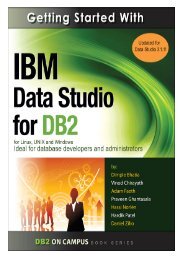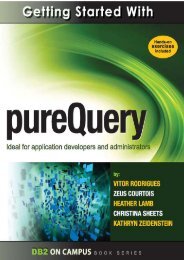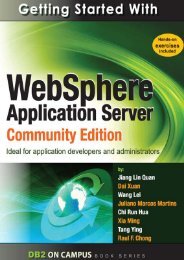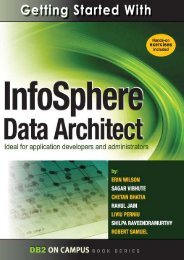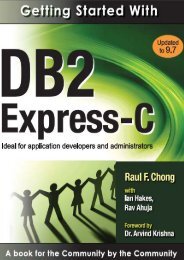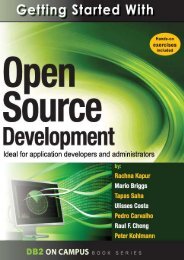Getting Started with Open Source Development
You also want an ePaper? Increase the reach of your titles
YUMPU automatically turns print PDFs into web optimized ePapers that Google loves.
48 <strong>Getting</strong> started <strong>with</strong> open source development<br />
violation is the case between the Free Software Foundation (FSF) and Cisco. In 2004 a<br />
German court ordered Cisco to stop selling its wireless routers because it was in violation<br />
of the terms and conditions of the GPL license - Cisco’s products were using GPL-licensed<br />
software in their code, but not providing free availability of their source code.<br />
Another case of license violation happened early in 2009 when Microsoft was found in<br />
violation of the GPL license on the Hyper-V code it released to the open source<br />
community. More information can be found at this link:<br />
http://www.theregister.co.uk/2009/07/23/microsoft_hyperv_gpl_violation/.<br />
So what is the right open source license to use for a given software? There is no magic<br />
formula but some of the things to consider are listed below:<br />
• Is the work in question a derived work? Or would the work be redistributed <strong>with</strong><br />
other open source software? If so, what are the license terms you have agreed as a<br />
licensee?<br />
• Do you want the software to be revenue generating? Review the different open<br />
source business models as described earlier in Chapter 2.<br />
• Do you want access to use licensees’ contributions? How do you add this clause to<br />
your license?<br />
• Review the licenses in the OSI website - http://www.opensource.org/licenses to see<br />
if any of the existing and approved licenses of OSI would be good for you to use.<br />
This and several other factors are things to consider while choosing an appropriate license<br />
for the software in question. Depending on the scope of the project you could get into legal<br />
discussions to help you chose an appropriate license.<br />
3.4 Exercises<br />
The OSI categorizes various approved licenses. Review these categories and the licenses'<br />
terms and conditions at http://www.opensource.org/licenses/category<br />
3.5 Summary<br />
In this chapter you learned about the concept of Intellectual Property and how it related to a<br />
license. You also learned about the relationship between a license, licensor and licensee.<br />
Next, the chapter explained what makes a license an open source license, and provided a<br />
description and comparison between the BSD, GPL and MIT licenses. Finally the chapter<br />
provided questions that would help you choose the most appropriate open source license<br />
for your needs.<br />
3.6 Review questions<br />
1. What is required for OSI license approval?<br />
2. Why is it important for developers to know about OSS licenses?




